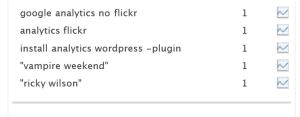This post will be short and sweet because I need to take a drive road test today because I am buying a brand new car!
Yesterday on my way home, I was reviewing a SEO whitepaper by Brian Clifton and Nikki Rae from Omega Digital Media tittled “How Search Engine Optimisation Works”. This 20-page document explains how search engines work and how search engine optimisation (SEO) can help you achieve high search engine visibility.
According to Clifton and Rae, web sites appearance on search engine results depends on 5 key factors (p. 8):
- Which Keywords the user entered
- Your web page Keyword Density for these keywords
- Your web page Keyword Prominence (page location) for these keywords
- Your Link Popularity – the number of other sites that link to you
- Your link and keyword Relevancy


As it becomes obvious the term that returned the most matches to idaconcpts is google analytics flickr. This makes sense because as of right now, 08/21/2008, my post that has an analysis of Flickr using Google Analytics is the most viewed page of this blog (30 views). The term flickr was included in 7 out of 20 of the search engine queries that matched idaconcpts. The term google had the same outcome.
Therefore, the terms google and flickr are golden ones to consider for my personal Google AdWords campaign. However, the important part is to be able to combine with appropriate terms (remember quality over quantity! I want my readers to remain in the blog, not leave right after they click on it!). Possible keywords are google analytics and the different mispellings of analytics (e.g. analytic, analystics, analytis)! Believe or not, including this misspelled words, inflates my search engine keyword result matching. Cheating? Clifton and Rae don’t believe so!
(p. 9) Don’t forgit misspelled keywhords! (p. 10) The Google Trends tool is an excellent free resource for checking mispellings, relative keyword popularities (e.g. product X versus product Y) and regional variation (e.g. cell phones versus mobile phone).
What do you think?
